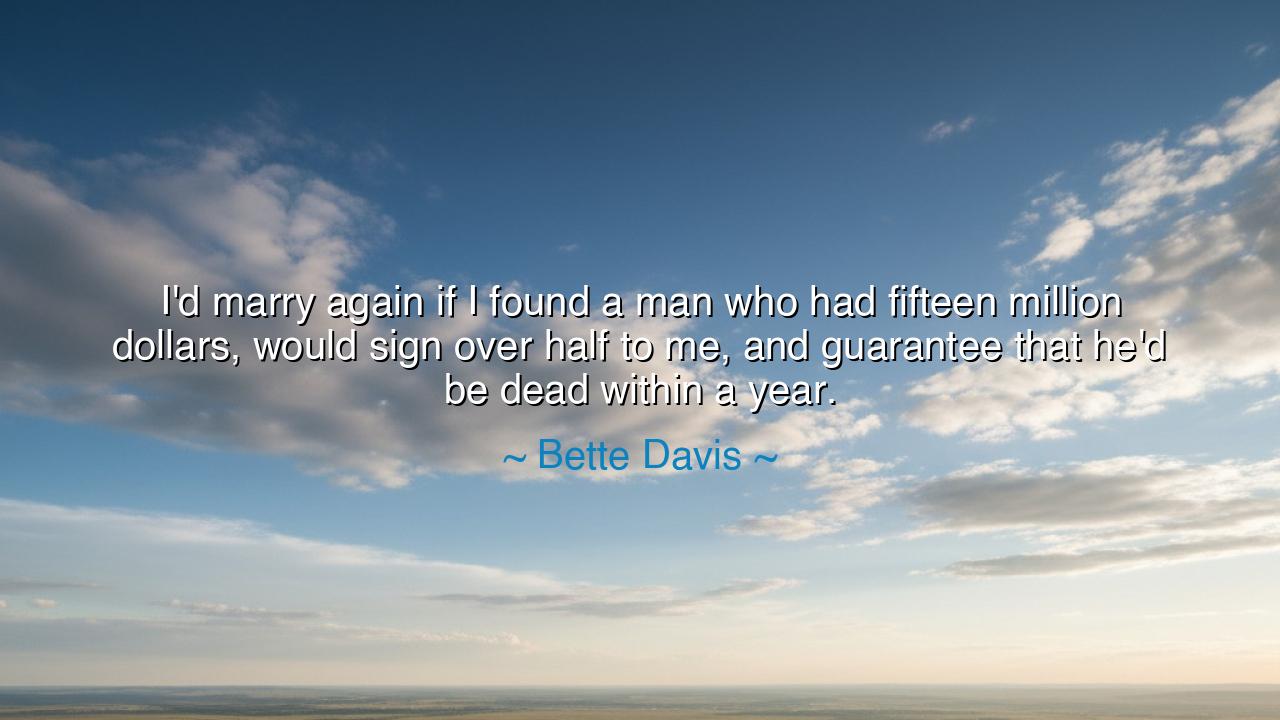
I'd marry again if I found a man who had fifteen million dollars
I'd marry again if I found a man who had fifteen million dollars, would sign over half to me, and guarantee that he'd be dead within a year.






Hear now, the sharp and unforgettable words of Bette Davis, the queen of fire and wit: “I’d marry again if I found a man who had fifteen million dollars, would sign over half to me, and guarantee that he’d be dead within a year.” At first, the line strikes like lightning—bitter, cynical, and laced with the dry humor of one who has seen too much of love’s illusions. But behind the jest lies a deeper wisdom, the hard-earned truth of a woman who had lived through both the glory and the grief of companionship. Her laughter, though biting, is not cruelty—it is the armor of one who has loved deeply and been burned, who has learned that not all unions are sanctuaries, and that sometimes the price of peace is solitude.
For Bette Davis, famed actress of Hollywood’s golden age, love was no romantic fantasy. She was a woman who dared to live and love fiercely, and she suffered the consequences of both. Married four times, she knew the burdens that came with fame, the betrayals of affection, and the loneliness that lurks behind the curtain of success. Thus her words, though wrapped in humor, emerge from the ashes of experience. When she speaks of a man with fifteen million dollars who must die within the year, she mocks the transactional nature of relationships that promise comfort but rob the soul. In truth, she is not seeking wealth nor vengeance—she is declaring her independence.
The ancients would have understood this. For even in the temples of wisdom, it was said that love can elevate or enslave. The philosopher Diotima, who taught Socrates the mysteries of love, spoke of two kinds of desire: one that clings to the body and fades, and one that ascends toward freedom. Davis’s words belong to the second kind, though they wear the mask of sarcasm. She had reached a place where the illusions of romance could no longer deceive her. Her laughter was not bitterness—it was liberation. It was her way of saying: “I have learned the cost of dependence, and I choose myself.”
In her time, women were still expected to find fulfillment through men—to marry for security, for appearance, for protection. But Davis, defiant and radiant, rejected that notion. She had carved her name into history by her own talent and will, not through the shadow of a husband. Her jest about marrying only under impossible conditions was a torch held high for every woman who had been told that her worth depended on being chosen. With this quip, she rewrote the rules of love, reminding the world that self-respect is the rarest and richest dowry.
There is a story told of her later years, when she was asked why she never sought another husband. She replied, “Why should I? I already married the best man I ever knew—my career.” It was not pride that spoke, but truth. She had poured her passion into her art, and in return, it gave her what no man could: purpose, expression, and immortality. And so, through her humor, Davis taught what the sages have always known—that love without equality is bondage, and that the greatest union is between the self and its destiny.
The laughter in her quote, then, is the laughter of wisdom. It is the sound of a woman who has walked through heartbreak and emerged with her soul intact. It teaches us that cynicism, when born from truth, can be a kind of clarity. To those who have suffered disappointment in love, her words whisper: do not despair—grow wiser. Do not sell your peace for the promise of companionship. Let your solitude be strong enough to sustain you until love comes as a choice, not a necessity.
So, my children of the heart, take this lesson to your lives: do not measure love by wealth, beauty, or convenience. Seek the kind of bond that enriches rather than empties you. And if the world laughs at your independence, laugh louder. For humor, when sharpened by truth, becomes a sword of dignity.
And when you hear Bette Davis’s bold declaration—“I’d marry again if I found a man with fifteen million dollars...”—do not hear bitterness. Hear instead the echo of freedom: the voice of one who has learned to love herself more fiercely than she was ever loved by another. In that, she found not cynicism, but her own kind of heaven.






AAdministratorAdministrator
Welcome, honored guests. Please leave a comment, we will respond soon